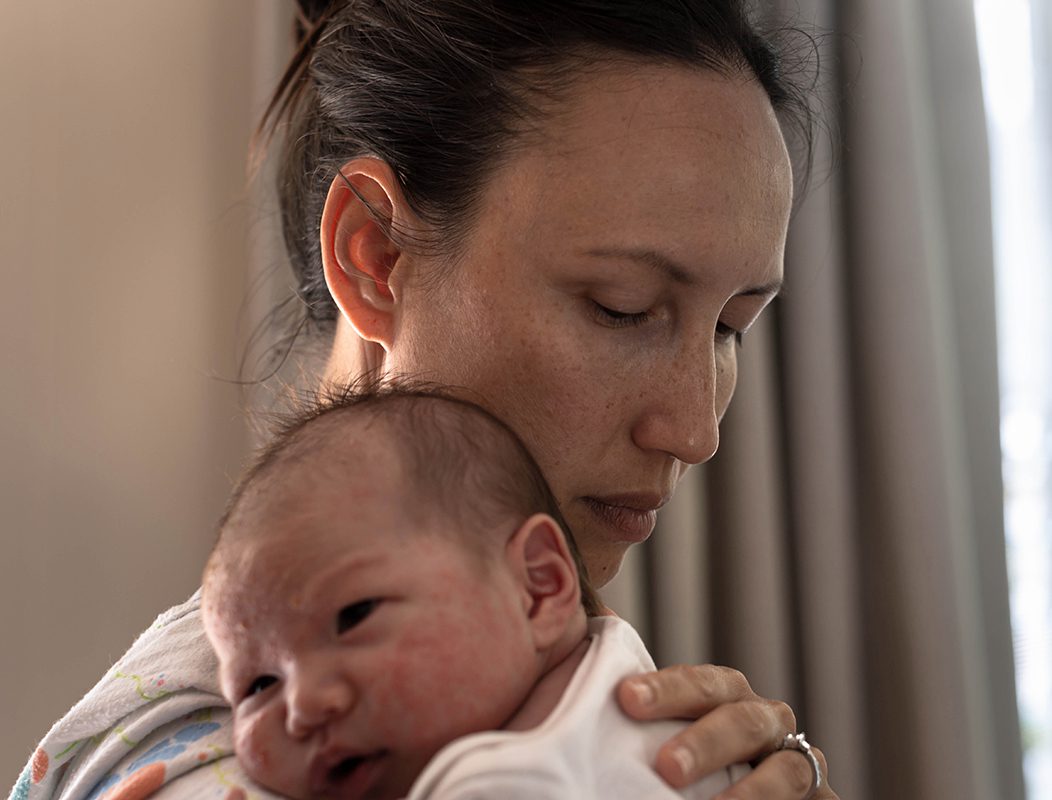Sadness isn’t necessarily the first feeling we think of when a baby is born. However, even in the happiest, healthiest, most prepared for births, the ordeal of pregnancy, labor, and becoming a mom (for the first time or not), is a massive shift for anyone—often the biggest shift in someone’s life.
Supporting a new mom is crucial for her well-being and recovery. While this period is typically filled with joy and excitement, it can also bring about overwhelming stress and sadness for some women. Feelings of sadness are called “baby blues,” and they usually diminish a few weeks after delivery.
Around one in seven women can develop postpartum depression (PPD). PPD lasts longer than “baby blues” and severely affects women’s daily lives. PPD affects the mother and her relationship with the infant. Maternal brain response and behavior are compromised in PPD.
Even more unsettling is the statistic that up to 50% of PPD in new mothers go undiagnosed—mostly because new mothers don’t want to share their depression with their close family and friends, for fear of judgment.
Here are some comprehensive ways you can offer support:
- Offer Resources: If you sense that someone you love may be overwhelmed after birth, Offer to help research local therapists or support groups specializing in postpartum mental health. The first-line treatment protocol for PPD is psychotherapy and antidepressant medications. Often, a thyroid disease has similar symptoms to PPD, but a completely different treatment. Proper diagnosis is so important.
- Listen and Validate: Create a safe and non-judgmental space for her to express her feelings. Listen actively and validate her emotions. Let her know that it’s okay to feel overwhelmed or sad, and that she’s not alone in this experience.
- Pitch In: Offer practical help with daily tasks like cooking, cleaning, or taking care of the baby. This can alleviate some of her stress and allow her to focus on self-care and recovery. Even small gestures like bringing over a meal or offering to run errands can make a significant difference.
- Therapeutic Support: Therapeutic interventions such as counseling or therapy can be incredibly beneficial for new moms struggling with postpartum depression. Encourage her to consider therapy as a part of her recovery journey. Offer to accompany her to therapy sessions or provide childcare during those times.
- Be Patient and Understanding: Recovery from postpartum depression is a process that takes time. Be patient and understanding as she navigates through her emotions and treatment. There may be good days and bad days, but your ongoing support and empathy can make a significant difference.
- Self-Care Buddy: When you are responsible for a new baby, it can feel like self-care is next to impossible. For many new moms, even taking a shower is a luxury. How can you make the space, permission, time, and joy in self-care? Holding baby while she grabs a coffee, offering a shoulder rub, or preparing a favorite meal with plenty of leftovers in the freezer are all simple ways to being some pleasure and joy into a day.
- Stay Connected: Continue to check in on her regularly and stay connected. Offer a listening ear, words of encouragement, and reminders that she is loved and supported. Even texting a meme keeps the lines open and doesn’t require too much energy from mom.
By offering comprehensive support that includes therapeutic interventions, practical assistance, and emotional validation, you can help a new mom navigate through postpartum depression and move towards a path of healing and recovery. Your support and kindness can make a world of difference during this challenging (and life-alteringly beautiful and sweet) time.
The Community Mental Health Hub at Hanna provides licensed, professional counseling for youth and families. Interested in accessing care from our team?



